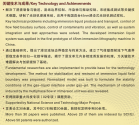One has to be careful about following the theory of comparative advantage too greatly, although given their populations it is to a certain extent understandable, but if the Netherlands, a smaller country population wise than them has ASML, why don't they themselves also have more prominence with regards to semiconductor manufacturing equipment? That is in part of rhetorical question since your comment than I am tagging actually answers it...
You answered your own question. Why doesn’t Holland run the whole process themselves? Why do they only make DUV/EUV but not the light source, chemicals, etc.


